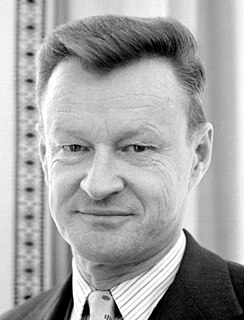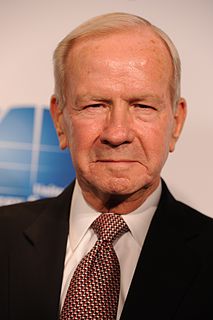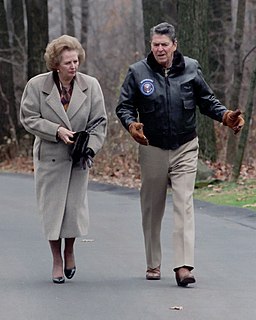Related Research Articles

Zbigniew Kazimierz Brzezinski, or Zbig, was a Polish-American diplomat and political scientist. He served as a counselor to President Lyndon B. Johnson from 1966 to 1968 and was President Jimmy Carter's National Security Advisor from 1977 to 1981. As a scholar, Brzezinski belonged to the realist school of international relations, standing in the geopolitical tradition of Halford Mackinder and Nicholas J. Spykman, while elements of liberal idealism have also been identified in his outlook. Brzezinski was the primary organizer of The Trilateral Commission.

Radio Free Europe/Radio Liberty (RFE/RL) is a United States government-funded organization that broadcasts and reports news, information, and analysis to countries in Eastern Europe, Central Asia, Caucasus, and the Middle East where it says that "the free flow of information is either banned by government authorities or not fully developed". RFE/RL is a private, non-profit 501(c)(3) corporation supervised by the U.S. Agency for Global Media, an independent government agency overseeing all U.S. federal government international broadcasting services.

Richard Vincent Allen was the United States National Security Advisor to President Ronald Reagan from 1981 to 1982, having been Reagan's chief foreign policy advisor from 1977. He has been a fellow of the Hoover Institution since 1983. He is a past member of the Defense Policy Board Advisory Committee.

Robert Carl "Bud" McFarlane is a retired Marine Corps officer who served as National Security Advisor to President of the United States Ronald Reagan from 1983 through 1985.

William Eldridge Odom was a United States Army lieutenant general who served as Director of the National Security Agency under President Ronald Reagan, which culminated a 31-year career in military intelligence, mainly specializing in matters relating to the Soviet Union. After his retirement from the military, he became a think tank policy expert and a university professor and became known for his outspoken criticism of the Iraq War and warrantless wiretapping of American citizens. He died of an apparent heart attack at his vacation home in Lincoln, Vermont.

William Patrick Clark Jr. was an American rancher, judge, and public servant who served under President Ronald Reagan as the Deputy Secretary of State from 1981 to 1982, United States National Security Advisor from 1982 to 1983, and the Secretary of the Interior from 1983 to 1985.

The main goal of the US foreign policy during the presidency of Ronald Reagan (1981–1989) was winning the Cold War and the rollback of Communism—which was achieved in the Revolutions of 1989 in Eastern Europe during 1989; in the German reunification in 1990; and in the Dissolution of the Soviet Union in 1991. Historians debate whom to credit, and how much. They agree that victory in the Cold War made the U.S. the world's only superpower, one with good relations with former Communist regimes in Russia and Eastern Europe.

Jack Foust Matlock Jr. is an American former ambassador, career Foreign Service Officer, a teacher, a historian, and a linguist. He was a specialist in Soviet affairs during some of the most tumultuous years of the Cold War, and served as the U.S. Ambassador to the Soviet Union from 1987 to 1991.

The relations between the United States of America and the Union of Soviet Socialist Republics (1922–1991) succeeded the previous relations between the Russian Empire and the United States from 1776 to 1917 and preceded modern-day relations between the Russian Federation and the United States that began in 1992. Full diplomatic relations between both countries were established in 1933, which was late due to the countries' mutual hostility. During World War II, both countries were briefly allies. At the end of the war, the first signs of post-war mistrust and hostility began to appear between the two countries, escalating into the Cold War; a period of tense hostile relations, with periods of détente.

The Institute of World Politics (IWP) is a graduate school of national security, intelligence, and international affairs in Washington, DC and Reston, VA. Founded in 1990, it offers courses related to intelligence, national security, and diplomatic communities.
Ronald Reagan was the 40th President of the United States (1981–1989). A Republican and former actor and governor of California, he energized the conservative movement in the United States from 1964. His basic foreign policy was to equal and surpass the Soviet Union in military strength, and put it on the road to what he called "the ash heap of history". By 1985, he began to co-operate closely with Soviet leader Mikhail Gorbachev–they even became friends–and negotiated large-scale disarmament projects. The Cold War was fading away and suddenly ended as Soviets lost control of Eastern Europe almost overnight in October 1989, nine months after Reagan was replaced in the White House by his vice president George H. W. Bush, who was following Reagan's policies. The Soviet Union itself was dissolved in December 1991. In terms of the Reagan doctrine, he promoted military, financial, and diplomatic support for anti-Communist insurgencies in Afghanistan, Nicaragua, and numerous other countries. For the most part, local communist power collapsed when the Soviet Union collapsed.
The Strategic Cooperation Agreement was concluded on November 30, 1981 between the United States and Israel during the first Reagan administration and coincided with an official visit of Israeli Prime Minister Menachem Begin. The agreement was signed by Israeli Defense Minister Ariel Sharon and American Secretary of Defense Caspar Weinberger and pledged specific actions from both parties to increase strategic cooperation between them. The main objective was to deter Soviet threats and ‘Soviet controlled forces’ in the Middle East. Israel had aimed for some time at the creation of a more formal bond which would commit the United States to a closer military cooperation. The signing marked the beginning of close security cooperation and coordination between the American and Israeli governments. It was formally reconfirmed at the time of Reagan’s second peace initiative, on April 21, 1988.

William Flynn Martin is an American energy economist, educator, and international diplomat. Martin served as Special Assistant to Ronald Reagan for National Security Affairs, Executive Secretary of the United States National Security Council, and United States Deputy Secretary of Energy during the Ronald Reagan Administration. He was President of the Council of the University for Peace, appointed to the Council by Secretary General of the United Nations Kofi Annan. In 1992, he was Executive Director of the Republican Platform committee under George H. W. Bush. William Martin served for ten years as Chairman of the Nuclear Energy Advisory Committee during the administrations of George W. Bush and Barack Obama.
Kenneth E. deGraffenreid retired in 2012 from his position as Professor of Intelligence Studies at The Institute of World Politics, where he taught since the graduate school's first summer session in 1992. He is now a professor emeritus at the IWP. Numerous published sources indicate that deGraffenreid has been involved in the highest echelons of the United States Intelligence Community: a 2004 article in The New Yorker mentioned that he was responsible for all Department of Defense "Special Access Programs" (SAPs). He is recognized as a leading authority in intelligence, foreign propaganda, information warfare, and counterintelligence. He was an early pioneer in the academic sub-discipline of intelligence studies which was in its nascency when he began teaching in 1992.

George Pratt Shultz was an American economist, diplomat, and businessman. He served in various positions under three different Republican presidents and is one of only two people to have held four different Cabinet-level posts. Shultz played a major role in shaping the foreign policy of the Ronald Reagan administration. From 1974 to 1982, he was an executive of the Bechtel Group, an engineering and services company. In the 2010s, Shultz was a prominent figure in the scandal of the biotech firm Theranos, continuing to support it as a board member in the face of mounting evidence of fraud.

Taras Kuzio is a British academic and expert in Ukrainian political, economic and security affairs. In 2010, he predicted the Russian annexation of Crimea that would result from the ousting of President Yanukovych. He has British citizenship, but is based in Toronto, Canada.

Full spectrum diplomacy is a combination of traditional, government-to-government diplomacy with the many components of public diplomacy as well as the integration of these two functions with other instruments of statecraft. The term was coined by Dr. John Lenczowski, the founder and president of the Institute of World Politics in Washington, D.C. in his book Full Spectrum Diplomacy and Grand Strategy: Reforming the Structure and Culture of U.S. Foreign Policy which was released in May, 2011.

National Security Decision Directive 77, was a U.S. National Security Directive signed on January 14, 1983, by President Ronald Reagan. The directive established a Special Planning Group (SPG) under the National Security Council (NSC) whose purpose was to strengthen, organize, plan, and coordinate public diplomacy of the United States relative to national security. This NSDD positioned the White House and the National Security Staff at the helm of public diplomacy coordination across government agencies. NSDD-77 lay the groundwork for the Reagan administration's aggressive public diplomacy strategy and included guidance for inter-agency working groups to execute wide-ranging tactics for information dissemination both domestically and internationally.
The Interagency Active Measures Working Group was a group led by the United States Department of State and later by the United States Information Agency (USIA). The group was formed early during the Reagan administration, in 1981, as an effort to counter aggressive Soviet disinformation.

Political warfare is the use of political means to compel an opponent to do one's will, based on hostile intent. The term political describes the calculated interaction between a government and a target audience, including another state's government, military, and/or general population. Governments use a variety of techniques to coerce certain actions, thereby gaining relative advantage over an opponent. The techniques include propaganda and psychological operations (PsyOps), which service national and military objectives respectively. Propaganda has many aspects and a hostile and coercive political purpose. Psychological operations are for strategic and tactical military objectives and may be intended for hostile military and civilian populations.
References
- 1 2 Fletcher, Schoen (June 2012). "Deception, Disinformation, and Strategic Communications: How One Interagency Group Made a Major Difference" (PDF). Strategic Perspectives. 11: 36.
- ↑ Reed, Thomas (2005). At the Abyss: An Insider's History of the Cold War. Presidio Press. p. 237.
- ↑ Reeves, Richard (2006). President Reagan: The Triumph of Imagination. Simon and Schuster. pp. 139–140.